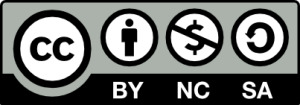35 Creative Commons
Libby Wheeles; Helena Marvin; and Tim Nelson
Introduction
In previous chapters, we discussed the increasing popularity of publishing scholarship open access: making materials freely available online. Open access publishing is just one aspect of the larger open movement: a movement (both within and outside of academia) to make materials free for viewing, for reuse, and for adaptation. Open materials include not just scholarship, but images, software, audio, video, data, and more.
One common mechanism for making materials open is publishing them under a Creative Commons (CC) license. CC licenses allow authors to make their materials open while still specifying certain conditions under which their work can be reused by others.
You may see some academic works published under a CC license. It’s also helpful to be aware of as you become a more advanced researcher and, perhaps, publish your own work online. This chapter offers a very short overview of different types of CC licenses you may encounter or use yourself.
Creative Commons
A Creative Commons (CC) license allows an author to make their work open for reuse, adaptation, or dissemination by others (or, some combination of these permissions).
CC licenses are standardized and recognizable by a common logo. You may recognize one of the CC licenses that UMSL uses for its video tutorials:

Watch the video below* (from the University of Houston Libraries) for an overview of what Creative Commons licenses can do for your work:
*Did you notice: If you look in this video’s description on YouTube, you can see that it was created using content they adapted from another university’s video. That original video was under a CC license, which gave permission for the librarians at the University of Houston to adapt their ideas to create their own version. The new version is also under a CC license!
Below, read through a very short description of the different types of CC licenses. If you ever want to publish your own work under a CC license, carefully consider which permissions you’d like others to have when reusing your material.
CC Licenses
CC0
A CC0 license places no restriction on how someone else may reuse your work. They do not have to give you credit, they may adapt your work, and they may make money off their version of your material.
CC BY
CC BY requires only that someone else credits you when they reuse your work. They are free to edit, share it under different permissions, and make money from your material.
CC BY-SA
CC BY-SA requires that someone reusing your work must (a) credit you and (b) reshare the work they created by building on your material under the same license you used (SA = “share alike”). SA requirements promote the publication of more open materials by people who use your work. They are still allowed to adapt your material or make money from the product they create using your work.
CC BY-NC
CC BY-NC prohibits someone reusing your work from making money from whatever their final product is. They can only reuse your work for noncommercial purposes. They must still credit you.
CC BY-ND
CC BY-ND (a) requires that people reusing your work must credit you and (b) are prohibited from editing your work in any way. They must use what you created in its original iteration (ND = “nonderivative”).
CC BY-NC-ND
CC BY-NC-ND combines several of the previous license characteristics. This license requires that users must credit you and prohibits derivative works as well as commercial uses.
CC BY-NC-SA
CC BY-NC-SA combines several of the previous license characteristics. This license requires that users must credit you and share their own work under the same license. They are also prohibited from reusing your work for commercial purposes.
Key Takeaways
- Creative Commons are a frequently used tool in the open movement to publish works that can be reused by others under certain conditions.
- Different CC licenses have different permissions. Common requirements include having to credit the author or share their work under a similar license; common prohibitions include restricting commercial use or creating derivative works (i.e., adapting it from the original).

